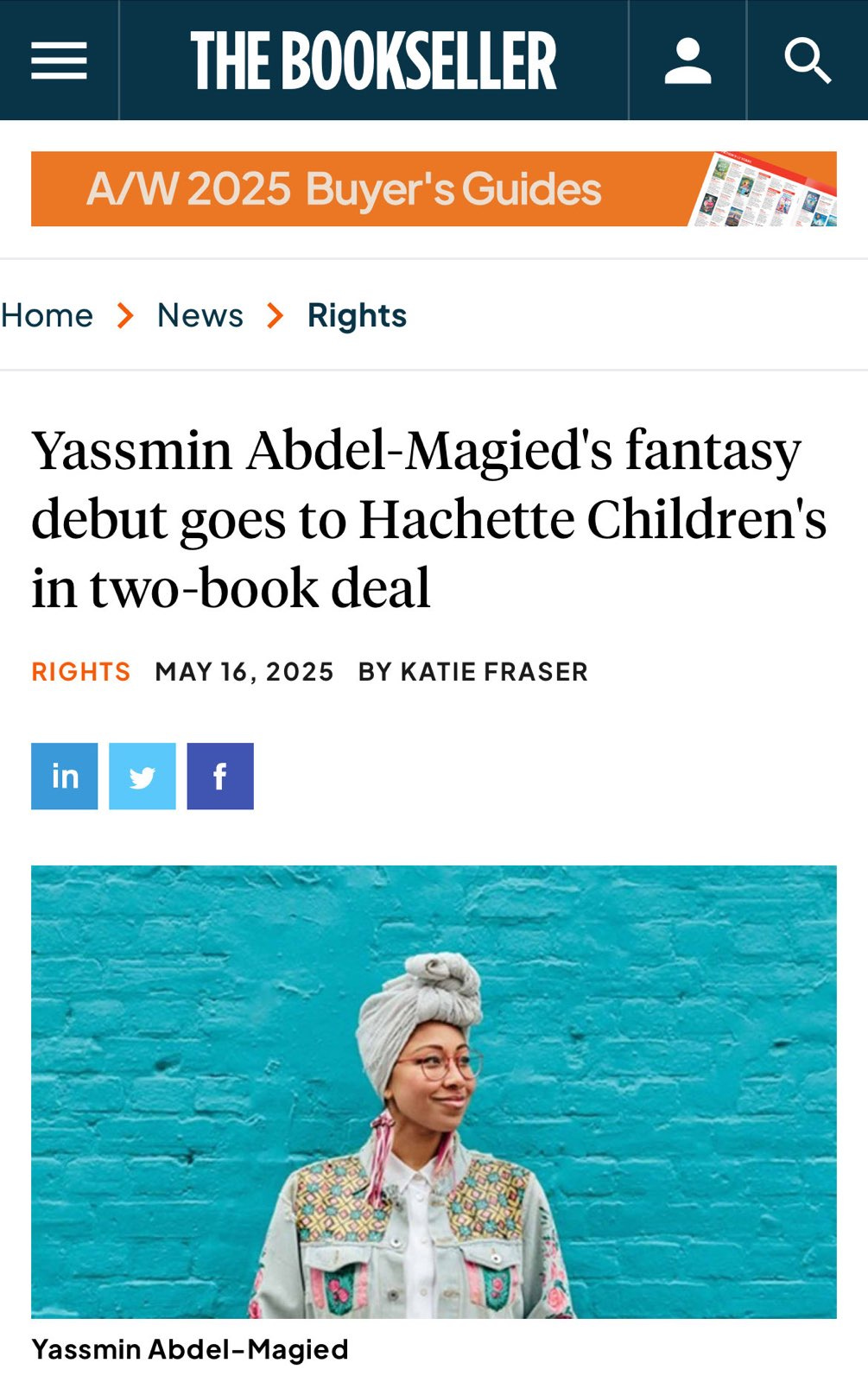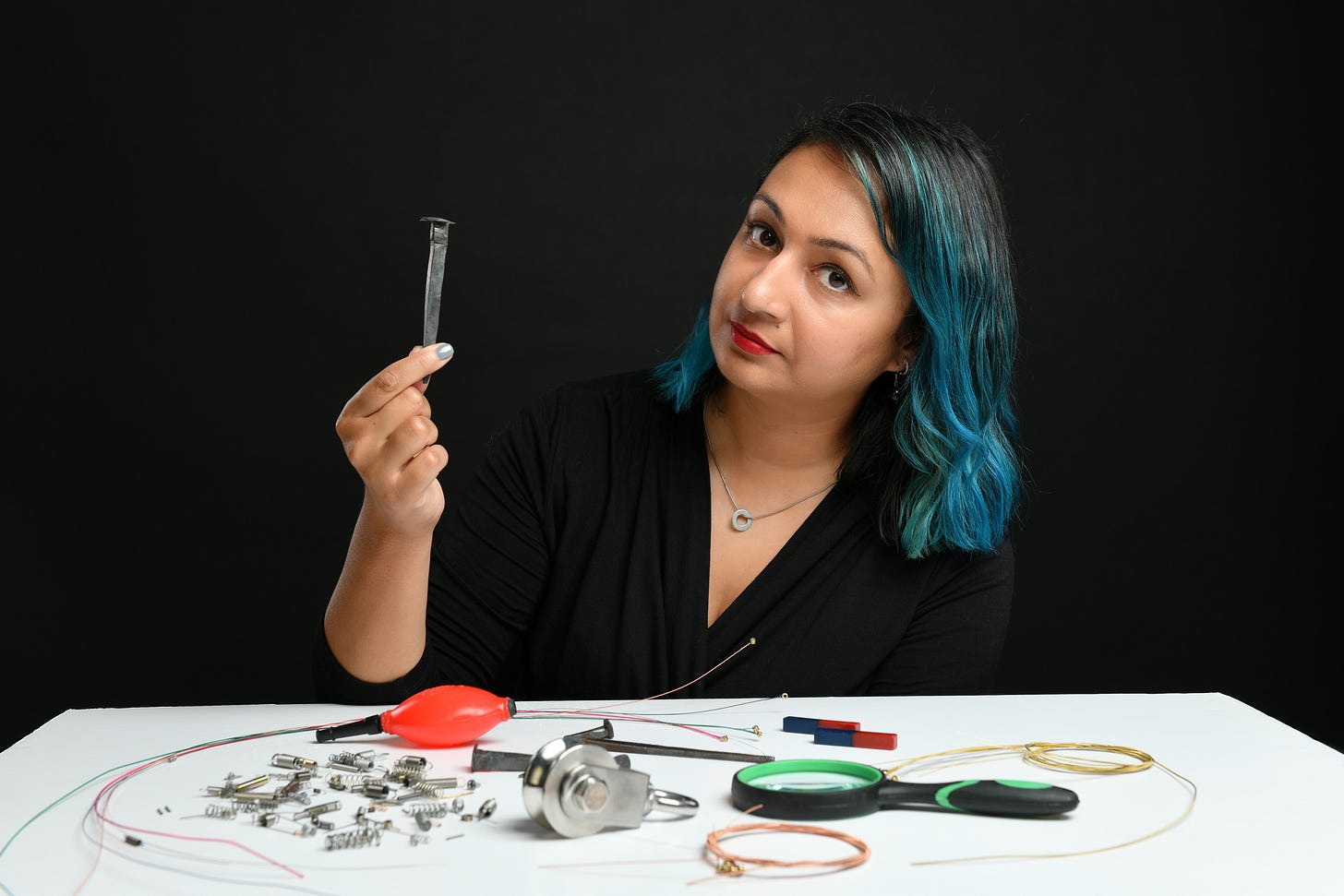Happy Sunday, lovely readers! Two things to share today…
The first is 🚨🚨🚨 !!book related news!! 🚨🚨🚨
My next TEEN SERIES is coming out in JAN 2026, inshallah! Check out the full bookseller announcement here. SILVERBROOK is a fantasy series, ‘action packed, warm and zinging with imagination,’ according to the publisher, Hachette. It’s been such fun working on this series. I can’t wait for you all to meet Yumna, the delightful main character, and all her wonderful family and friends. And oh, it’s based in an imaginary village in LINCOLNSHIRE!
The second order of business today is to introduce you to the guest writer for today’s newsletter. Those of you who have followed me for some time will be familiar with my background as an engineer - a mechanical engineer to be exact! It’s not often I get to meet others like me, engineers turned writers. Well, Roma Agrawal is one of those rare and wonderful folks. I am so chuffed that she agreed to write a post this week for GOOD CHAT, on the vital intersection of engineering and storytelling. ENJOY!
I walked onto stage, faking a smile, faking confidence, and faking good posture. Situated, I looked around at the hundreds of partially shadowed faces in an attempt to ground myself. After a brief introduction, I tried my new material about small inventions. “Let’s focus on the lens first, then I’ll talk about the magnet, which I find extremely attractive, before revealing the most revolutionary invention, the wheel”.
I’m an engineer – a structural engineer to be precise. After studying physics at university, I decided to pursue a masters, and then a career, in engineering. Solving gnarly problems using design and maths was an incredibly satisfying process for me, and armed with these skills and this passion, I went on to help with the design of a footbridge in Newcastle, refurbed a train station in South London, and spent six years of my career on The Shard. After 15 years of doing this, I left to become a full-time author, speaker, and broadcaster. (That is a story for another time, and also how Yassmin and I crossed paths.)
I now spend my time telling people tales about our engineering, which, let’s face it, is everything human-made around us. I delve into the histories of where our inventions originated, the humans behind them, the social impact they have, and how the ability to engineer is to hold power. Across four books, a handful of podcasts and documentaries, and thousands of talks, I’ve shared these engineering stories. Of Fazlur Khan, a Bangladeshi immigrant to the USA who changed the way we design skyscrapers. Of Thomas Jefferson selling hand-forged nails made by enslaved Black men and children to keep his plantation running. And of Emily Warren Roebling, the 19th century woman who got the Brooklyn Bride built.
On first glance, moving from a technical engineering career to storytelling might seem like quite the leap, and in many ways, it is. Communication wasn’t something that wasn’t actively taught on my degree course twenty years ago, but to my surprise, I realised its importance soon after starting out in my first job. (Maybe that’s also true of your profession.)
Yes, I did calculations, modelled buildings and bridges using software, and looked up regulations to figure out the forces I needed to check my structures for. But, right from the start, I threw ideas about with the structural engineers around me. I attended meetings with architects, clients, surveyors and other engineers. I went to construction sites to check that things were being built as we expected. I realised that it didn’t matter how good my idea to solve something was, if I couldn’t get it across to others effectively. Central to my role was being able to explain my reasoning, my design, my solutions to problems, and sometimes challenging other designers about what was possible in an understandable way, free from jargon. And so, in addition to running the numbers, I was constantly speaking to people, doing presentations, sketching, and writing reports – a heck-of-a-lot-of communicating. And, I loved it.
I now spend my time telling people tales about our engineering, which, let’s face it, is everything human-made around us.
This soon extended beyond my job into presentations at schools, universities, women’s groups and other non-engineering audiences. After two books, I decided to give this a go as a full-time career. I wrote more, spoke more, did more radio and became adept at it. So why did I end up doing a comedy course?
Someone once asked me, if I had no financial and family constraints, if everything lined up around my work, what work would I do? To my surprise, the answer that immediately came to mind was to be a standup comedian. Yes, I was an avid consumer of comedy on television and podcasts, but I never thought that was something I would even consider, until that moment. Maybe switching careers wasn’t the right step, but that didn’t stop me from learning.
So, I signed up for a ten-week comedy programme. We were taught how to create tension in our set – conveying our words that left the audience wanting more. We played word improvisation games. We pretended to get unexpectedly angry about minor issues. Every week, we had to write a new five-minute set. It was stressful, and it was exhilarating. It all culminated in a showcase in which all the cohort delivered their tight-five on stage to an audience of our friends and family. I’d never felt so free.
Comedy gave me even more than I expected. I went in thinking that I’ll learn how to deliver good jokes (or, let’s face it, terrible puns in my case) in a confident and well-timed fashion. I did learn that, but I also realised that comedy is 70% about the writing, in my opinion anyway. Thinking deeply about how to formulate my words, my stories, to deliver maximum impact on stage has made me a better writer. I’ve become better at weaving narratives about seemingly dull engineering topics – like concrete – thinking of them as characters and trying to unleash their personalities on my readers and listeners. Interruptions from folks (hecklers) in meetings (men) or in my audiences (also men) no longer throws me off my flow. (I look at them intently, and say, can you repeat what you just said? I recommend it, it’s fun to watch them squirm.)
So, engineers, think of communication as a crucial skill to help you get ahead, but also to just have fun.
To date, I’ve performed five times at science comedy showcases and festivals, attended by the very best audience, nerds. I’ve made friends with other science comedians (yes, we’re a thing). And all this has even led to a stellar podcast idea, which is one of the projects that is bubbling away in the background.
So, engineers, think of communication as a crucial skill to help you get ahead, but also to just have fun. And sure, do the writing and speaking practice. But to be better at your job, there’s nothing like being chucked on stage to perform five minutes of comedy to rapidly hone all the skills. Come to think of it, this is true whether you’re an engineer, or not.
To learn more about Roma’s work, check out her website, and sign up (free!) for her Substack: Riveting, with Roma.






Thank you Yassmin!! So excited about your new books xx